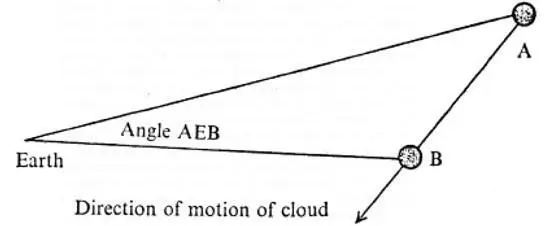Fred Hoyle - The Black Cloud
Здесь есть возможность читать онлайн «Fred Hoyle - The Black Cloud» весь текст электронной книги совершенно бесплатно (целиком полную версию без сокращений). В некоторых случаях можно слушать аудио, скачать через торрент в формате fb2 и присутствует краткое содержание. Жанр: Фантастика и фэнтези, на английском языке. Описание произведения, (предисловие) а так же отзывы посетителей доступны на портале библиотеки ЛибКат.
- Название:The Black Cloud
- Автор:
- Жанр:
- Год:неизвестен
- ISBN:нет данных
- Рейтинг книги:5 / 5. Голосов: 1
-
Избранное:Добавить в избранное
- Отзывы:
-
Ваша оценка:
- 100
- 1
- 2
- 3
- 4
- 5
The Black Cloud: краткое содержание, описание и аннотация
Предлагаем к чтению аннотацию, описание, краткое содержание или предисловие (зависит от того, что написал сам автор книги «The Black Cloud»). Если вы не нашли необходимую информацию о книге — напишите в комментариях, мы постараемся отыскать её.
The Black Cloud — читать онлайн бесплатно полную книгу (весь текст) целиком
Ниже представлен текст книги, разбитый по страницам. Система сохранения места последней прочитанной страницы, позволяет с удобством читать онлайн бесплатно книгу «The Black Cloud», без необходимости каждый раз заново искать на чём Вы остановились. Поставьте закладку, и сможете в любой момент перейти на страницу, на которой закончили чтение.
Интервал:
Закладка:

“On the facts as they’ve been given to us that cloud is going to score a bull’s eye, plumb in the middle of the target. Remember that it’s already two and a half degrees in diameter. The transverse velocity would have to be as much as ten per cent or so of the radial velocity if it were to miss us. And that would imply a far greater angular motion of the centre than Dr Marlowe says has taken place. The other question I’d like to ask is, why wasn’t the cloud detected sooner? I don’t want to be rude about it, but it seems very surprising that it wasn’t picked up quite a while ago, say ten years ago.”
“That of course was the first thing that sprang to my mind,” answered Marlowe. “It seemed so astonishing that I could scarcely credit the validity of Jensen’s work. But then I saw a number of reasons. If a bright nova or a supernova were to flash out in the sky it would immediately be detected by thousands of ordinary people, let alone by astronomers. But this is not something bright, it’s something dark, and that’s not so easy to pick up — a dark patch is pretty well camouflaged against the sky. Of course if one of the stars that has been hidden by the cloud had happened to be a bright fellow it would have been spotted. The disappearance of a bright star is not so easy to detect as the appearance of a new bright star, but it would nevertheless have been noticed by thousands of professional and amateur astronomers. It happened, however, that all the stars near the cloud are telescopic, none brighter than eighth magnitude. That’s the first mischance. Then you must know that in order to get good seeing conditions we prefer to work on objects near the zenith, whereas this cloud lies rather low in our sky. So we would naturally tend to avoid that part of the sky unless it happened to contain some particularly interesting material, which by a second mischance (if we exclude the case of the cloud) it does not. It is true that to observatories in the southern hemisphere the cloud would be high in the sky, but observatories in the southern hemisphere are hard put to it with their small staffs to get through a host of important problems connected with the Magellanic Clouds and the nucleus of the Galaxy. The cloud had to be detected sooner or later. It turned out to be later, but it might have been sooner. That’s all I can say.”
“It’s too late to worry about that now,” said the Director. “Our next step must be to measure the speed with which the cloud is moving towards us. Marlowe and I have had a long talk about it, and we think it should be possible. Stars on the fringe of the cloud are partially obscured, as the plates taken by Marlowe last night show. Their spectrum should show absorption lines due to the cloud, and the Doppler shift will give us the speed.”
“Then it should be possible to calculate how long the cloud will be before it reaches us,” joined in Barnett. “I must say I don’t like the look of things. The way the cloud has increased its angular diameter during the last twenty years makes it look as if it’ll be on top of us within fifty or sixty years. How long do you think it’ll take to get a Doppler shift?”
“Perhaps about a week. It shouldn’t be a difficult job.”
“Sorry I don’t understand all this,” broke in Weichart. “I don’t see why you need the speed of the cloud. You can calculate straight away how long the cloud is going to take to reach us. Here, let me do it. My guess is that the answer will turn out at much less than fifty years.”
For the second time Weichart left his seat, went to the blackboard, and cleaned off his previous drawings.
“Could we have Jensen’s two slides again please?”
When Emerson had flashed them up, first one and then the other, Weichart asked: ‘Could you estimate how much larger the cloud is in the second slide?”
“I would say about five per cent larger. It may be a little more or a little less, but certainly not very far away from that,” answered Marlowe.
“Right,” Weichart continued, “let’s begin by defining a few symbols.”
Then followed a somewhat lengthy calculation at the end of which Weichart announced:
“And so you see that the black cloud will be here by August 1965, or possibly sooner if some of the present estimates have to be corrected.”
Then he stood back from the blackboard, checking through his mathematical argument.
“It certainly looks all right — very straightforward in fact,” said Marlowe, putting out great volumes of smoke. [1] The details of Weichart’s remarks and work while at the blackboard were as follows: Write α for the present angular diameter of the cloud, measured in radians, d for the linear diameter of the cloud, D for its distance away from us, V for its velocity of approach, T for the time required for it to reach the solar system. To make a start, evidently we have α = d/D Differentiate this equation with respect to time t and we get But so that we can write Also we have Hence we can get rid of V , arriving at This is turning out easier than I thought. Here’s the answer already The last step is to approximate by finite intervals, , where Δ t = 1 month corresponding to the time difference between Dr Jensen’s two plates; and from what Dr Marlowe has estimated Δα is about 5 per cent of α, i.e Therefore T = 20Δ t = 20 months.
“Yes, it seems unimpeachably correct,” answered Weichart.
At the end of Weichart’s astonishing calculation, the Director had thought it wise to caution the whole meeting to secrecy. Whether they were right or wrong, no good could come of talking outside the Observatory, not even at home. Once the spark was struck the story would spread like wildfire, and would be in the papers in next to no time. The Director had never had any cause to think highly of newspaper reporters, particularly of their scientific accuracy.
From midday to two o’clock he sat alone in his office, wrestling with the most difficult situation he had ever experienced. It was utterly antipathetic to his nature to announce any result or to take steps on the basis of a result until it had been repeatedly checked and cross-checked. Yet would it be right for him to maintain silence for a fortnight or more? It would be two or three weeks at least before every facet of the matter were fully investigated. Could he afford the time? For perhaps the tenth time he worked through Weichart’s argument. He could see no flaw in it.
At length he called in his secretary.
“Please will you ask Caltech to fix me a seat on the night plane to Washington, the one that leaves about nine o’clock? Then get Dr Ferguson on the phone.”
James Ferguson was a big noise in the National Science Foundation, controlling all the activities of the Foundation in physics, astronomy, and mathematics. He had been much surprised at Herrick’s phone call of the previous day. It was quite unlike Herrick to fix appointments at one day’s notice.
“I can’t imagine what can have bitten Herrick,” he told his wife at breakfast, “to come chasing over to Washington like this. He was quite insistent about it. Sounded agitated, so I said I’d pick him up at the airport.”
“Well, an occasional mystery is good for the system,” said his wife. “You’ll know soon enough.”
On the way from the airport to the city, Herrick would commit himself to nothing but conventional trivialities. It was not until he was in Ferguson’s office that he came to the issue.
“There’s no danger of us being overheard, I suppose?”
“Goodness, man, is it as serious as that? Wait a minute.”
Читать дальшеИнтервал:
Закладка:
Похожие книги на «The Black Cloud»
Представляем Вашему вниманию похожие книги на «The Black Cloud» списком для выбора. Мы отобрали схожую по названию и смыслу литературу в надежде предоставить читателям больше вариантов отыскать новые, интересные, ещё непрочитанные произведения.
Обсуждение, отзывы о книге «The Black Cloud» и просто собственные мнения читателей. Оставьте ваши комментарии, напишите, что Вы думаете о произведении, его смысле или главных героях. Укажите что конкретно понравилось, а что нет, и почему Вы так считаете.












